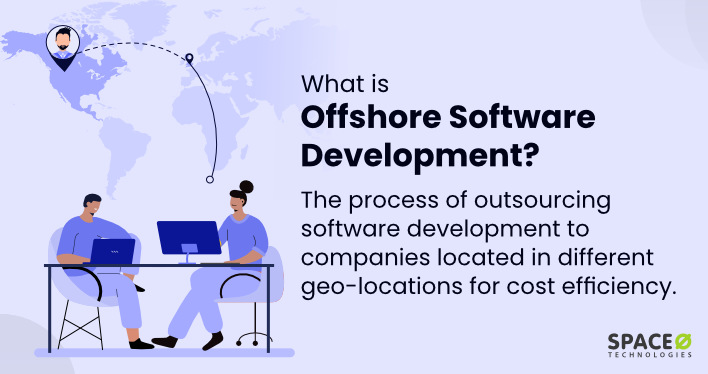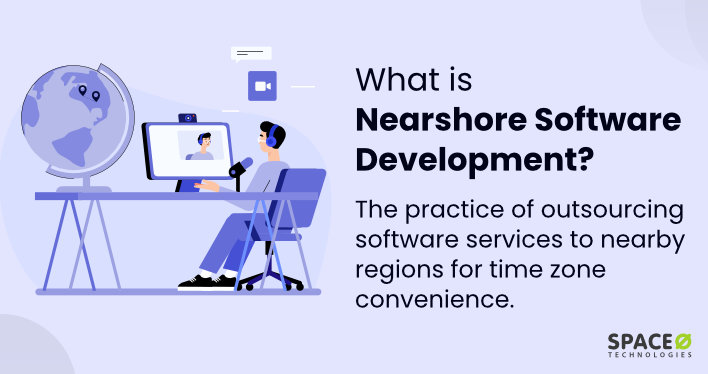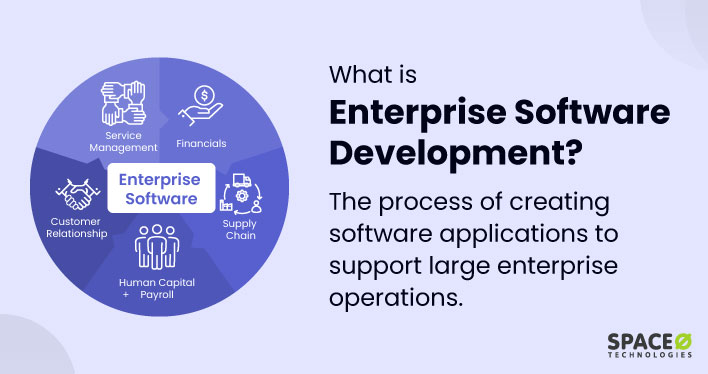Contents
What is Offshore Software Development?
Offshore software development is the practice of outsourcing development services or hiring a software development team from a company located in a different country. This country offers a lower cost of labor, and the goal is to complete software projects or specific software-related tasks.
In contrast, nearshore software development is about outsourcing to a nearby country with similar time zones and languages. This model offers benefits like easier collaboration due to proximity while having cost savings and global talent access.
Despite the geographical distance, offshore development offers advantages such as access to a vast global talent pool, making it a strategic choice for businesses aiming to optimize software projects while managing expenses efficiently.
Let’s discuss the comparison of both the outsourcing models in detail.
Difference Between Offshore and Onshore Software Development
Here is a table that contains a complete comparison of offshore and onshore software development.
| Aspects | Offshore Software Development | Onshore Software Development |
|---|---|---|
| Location of Development Team | Located in different countries or regions. | Located within the same geographical region. |
| Cost Considerations | Typically cost-effective due to lower labor and operational costs in offshore locations. | Often more expensive due to higher labor and operational costs in the same region as the client. |
| Access to Global Talent | Offers access to a diverse global talent pool, facilitating the selection of experts from around the world. | Limited to the talent available within the same geographical area, potentially restricting the diversity of expertise. |
| Time Zone Differences | Time zone differences can be leveraged to maintain a continuous workflow, enabling work around the clock. | Time zone alignment can be easier, but it may not allow for 24/7 work cycles without additional shifts. |
| Communication and Collaboration | May require more robust communication and collaboration tools to bridge potential language and cultural barriers. | Typically involves communication in the same language and within a familiar cultural context, potentially simplifying interactions. |
| Project Control and Oversight | May require more proactive project management and oversight due to geographical distance and potential differences in work practices. | Easier to have direct control and oversight of the project due to proximity and shared work hours. |
| Response Time | Response time may vary depending on time zones, potentially leading to longer turnaround times for urgent matters. | Generally, quicker response times are possible for immediate needs and queries. |
| Cultural Considerations | Cultural diversity among team members may require sensitivity and adaptability to varying work styles and practices. | Typically, cultural alignment is more straightforward, as team members share the same culture and work norms. |
| Cost of Living | Labor costs are often lower due to differences in the cost of living in offshore locations. | Labor costs may be higher due to the higher cost of living in the same region as the client. |
| Legal and Regulatory Considerations | May involve navigating international legal and regulatory differences, requiring additional compliance efforts. | Typically, compliance with local laws and regulations is more straightforward and aligned with the client’s location. |
After covering the difference between offshore and nearshore models now you know which is the best outsourcing model as per your requirements. Let’s discuss the key advantages of offshore development.
6 Key Advantages of Offshore Software Development
Here are the key advantages of offshore software development.
Provides Significant Cost Efficiency for Your Projects
- Offshore software development outsourcing reduces labor and operational costs, maximizing budget utilization.
- Cost-efficient budget allocation leads to a higher ROI for software projects, particularly for complex and long-term ones.
Offers Access to Highly Specialized Skills and Expertise
- Access to a global talent pool of experts with extensive knowledge in technologies and industry domains.
- Collaborate with expert talent to tackle complex projects and drive innovation.
Utilizes a Vast Global Resource Pool of Talent for Your Benefit
- Work with professionals from diverse backgrounds, fostering creativity and diverse problem-solving.
- Assemble tailored teams for unique project requirements, ensuring the right expertise for each task.
Optimizes Project Time Management and Efficiency
- Leverage time zone differences for a 24/7 work cycle, which results in faster completion of your project.
- Faster completion of your project leads to quicker time-to-market, which enhances competitiveness.
Scales and Adapts Seamlessly with a Flexible Offshore Team
- Easily scale teams up or down to match changing project needs, optimizing resource allocation.
- Quick response to evolving project demands without the complexities of in-house hiring or downsizing.
Allows You to Direct Your Focus on Core Business Competencies
- Concentrate on strategic initiatives, product development, marketing, and customer service, boosting core business growth.
- Delegating technical aspects to offshore experts optimizes internal resource allocation.
3 Common Challenges of Offshore Software Development
Here are the challenges of offshore software development.
Lacks Immediate Time Zone Coordination
Managing such an offshore development team that is spread across different time zones can lead to coordination difficulties. Real-time communication may be hindered, and addressing urgent issues promptly can become a challenge.
SolutionImplement a 24/7 support system for immediate issue resolution, ensuring communication despite time zone disparities.
Difficult to Overcome Language and Cultural Barriers
Language differences and diverse cultural norms create barriers within an offshore team. These differences may lead to misunderstandings, impacting the efficiency of communication and collaboration.
SolutionFoster an inclusive team culture through language training and cultural sensitivity workshops to bridge communication gaps effectively.
Not Able to Ensure Quality Assurance
Ensuring consistent quality assurance across a geographically distant development team can be complex. Transparent collaboration for quality control may not always be straightforward.
SolutionMaintain a centralized repository of project documentation and testing results, facilitating collaborative quality checks and ensuring quality consistency.
When to Consider Offshore Software Development
Offshore development becomes an attractive option when you aim to reduce project costs. Regions with lower labor costs allow you to leverage skilled talent without exceeding your budget.
Consider offshore development when your project requires niche skills and technologies that may not be readily accessible locally. Offshore development teams often possess this specialized expertise.
Offshore teams, operating in varying time zones, enable continuous 24/7 development and support. This ensures swift project progress and efficient issue resolution.
For intricate or large-scale projects, offshore development offers access to a diverse skill set, abundant resources, and specialized proficiency, making it an ideal choice.
When planning to expand into international markets, offshore development becomes essential. This permits adjustments in the software to suit local customer demand to successfully develop a market.
How to Choose the Best Offshore Software Development Company
Choosing an offshore software development company that is aligned with your project objectives is important. To make an informed choice, consider the following factors:
- Assess the company’s industry-specific expertise and track record in delivering successful projects.
- Contact previous clients or read testimonials to gauge the company’s reputation and client satisfaction.
- Understand their development methodologies, project management tools, and processes to ensure efficient collaboration.
- Verify the company’s ability to scale resources according to your project’s evolving needs.
- Ensure robust data security measures and compliance with relevant regulations for safeguarding sensitive information.
- Prioritize value over cost, and consider the long-term benefits of investing in quality software development services.
- Consider cultural compatibility, such as in terms of work ethic, time differences and holidays so that everyone can coordinate effortlessly.
- Pick an offshore development company that is open about development costs, progress, and risks associated with a project.
- Ask about post-development services and maintenance support to ensure that problems will be taken care of after the job is finished.
If you think carefully about these aspects, then you can find the most suitable among the various offshore software development companies to achieve the best outcome for your software development project.
To sum up, offshore development refers to outsourcing work or creating teams in foreign places with abundant low-cost talent. However, it also presents challenges like time zone differences and language barriers.
Deciding when to go offshore depends on factors like budget and project complexity while selecting the right company involves considering expertise, scalability, and security. Offshore development is a strategic choice for businesses aiming to optimize software projects.






